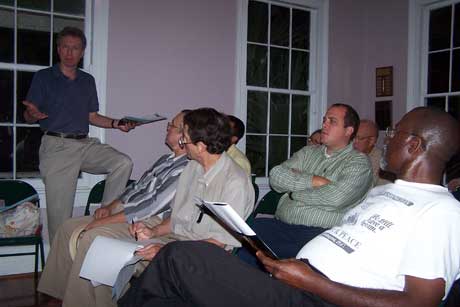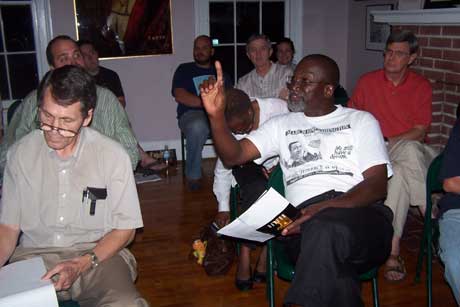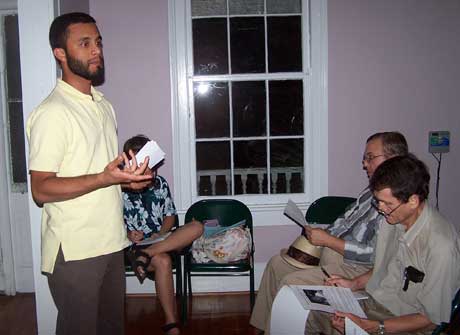Congressional Democrats are moving rapidly on legislation aimed at overturning a controversial Supreme Court ruling they say eviscerated pay discrimination provisions of the 1964 Civil Rights Act.
Within weeks of the May 29 court bombshell, Congress held hearings on proposals to restore equal pay provisions in Title VII of the Civil Rights Act to the status before the ruling, written by the court’s newest justice, Samuel Alito. On July 31, the House of Representatives voted 225-199 to pass a bill, and a Senate companion bill is expected to get hearings this fall.
The business community has lined up against the measure, however, and President George W. Bush pledged a veto if it passes Congress. That could make the issue part of the 2008 presidential campaign.
So far, votes are mostly along party lines: only two House Republicans voted for it, Representatives Chris Shays of Connecticut and Don Young of Alaska. All but six House Democrats voted for it. Two powerhouse Republicans are lead sponsors in the Senate, however: Senators Arlen Specter of Pennsylvania and Olympia Snowe of Maine, leading Marcia Greenberger of the National Women’s Law Center to predict a more bipartisan prospect there.
“The leadership in both the House and Senate are committed to move this very quickly because the decision has caused an unacceptable gaping hole in civil rights laws,” she said.
House sponsors named their proposal the Lilly Ledbetter Fair Pay Act of 2007 to honor the Alabama woman who sued Goodyear Tire Company after belatedly discovering she had been paid far less than virtually all her male factory co-workers. A jury found Goodyear’s bias to be so pervasive it awarded $3 million to Ledbetter, who had gotten a top performance award from the company in 1996. Because of a 1991 law capping damage awards, that $3 million was reduced to $300,000.
Then the Supreme Court, now under Bush appointee Chief Justice John Roberts, ruled against her, agreeing with a Bush administration argument that she had filed her lawsuit too late; she would have had to file charges within 180 days of the first discriminatory paycheck she got from Goodyear. The Ledbetter legislation would restore the traditional standard, enunciated by most federal courts and the Equal Employment Opportunity Commission, that pay discrimination claims had to be filed within 180 days of any discriminatory paycheck – including the last one.
When Ledbetter testified before the House Committee on Education and Labor, she said it would have been impossible for her to meet the Alito-Roberts criteria. She had been hired in 1979 as a line supervisor and said she worked hard for 19 years, did every job the men did, but had no clue she got much less money for the same work.
In her final years at Goodyear, “I got the feeling I was being paid less than the men but there was no way to know. Pay levels were kept strictly confidential.” An anonymous note told her the brutal truth. “I found out I was making $3,700 a month and all the men were earning $4,300 to $5,200 a month.”
The business community was thrilled at the ruling, one of the most favorable they have gotten so far from the Roberts court, but their opposition to the Ledbetter bill is proving to be a tricky sell. The labor policy chief for the U.S. Chamber of Commerce, Michael Eastman, told the Washington Post that it is a tough issue, since “everyone is opposed to unequal pay for equal work.” So far, business – and the bulk of congressional Republicans – are making a more technical argument: that the Democratic bills would lift the statute of limitations and subject businesses to frivolous claims filed decades after a problem.
The American Bar Association debunked that notion. ABA President Karen J. Mathis said in a June 1 op-ed that the ruling would make Title VII “almost useless in combating pay discrimination in the workforce” because “it is difficult, if not impossible, for an employee to know within six months that pay bias has cheated him or her of a fair paycheck.”
In an Aug. 14 policy position, the ABA urged Congress to overturn the Supreme Court ruling “to ensure that in claims involving discrimination in pay, the statute of limitations runs from each paycheck reflecting an improper disparity.” It said the Supreme Court’s reading of the law “will engender confusion and unfairness. It will deny remedies to many victims of discrimination, encourage subterfuge by employers, precipitate unwarranted claims and generally frustrate the purposes underlying Title VII.”
What happens next depends partly on whether Lilly Ledbetter becomes a household name – and whether grass roots groups connect with the issue. A DakotaWomen site posted a blog recently that criticized Representative Michele Bachmann (R-MN) for saying if the bill passed, corporations wouldn’t hire women out of fear they would be sued 40 years from now.
Ledbetter’s House committee testimony was posted on YouTube. People for the American Way posted another of her statements on a separate YouTube site, gambling that the blatant pay disparities she suffered will resonate with many people.
v
Ledbetter says her own experience confirms that connection. “Since the court decision, everywhere I go, women come up to me in the grocery stores, in church, just out in the park and they tell me they understand how I feel. They’ve been there. The same thing happened to them. Because of their sex, they did not get paid equally as the males.”
Peggy Simpson, The Women’s Media Center
12 Sept. 2007







